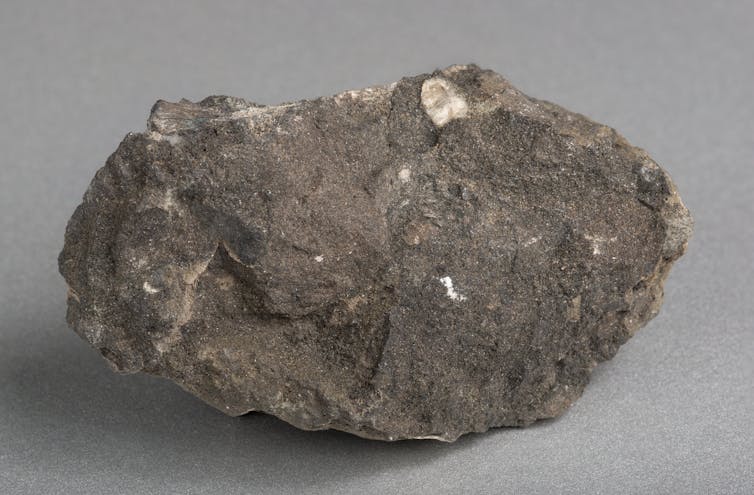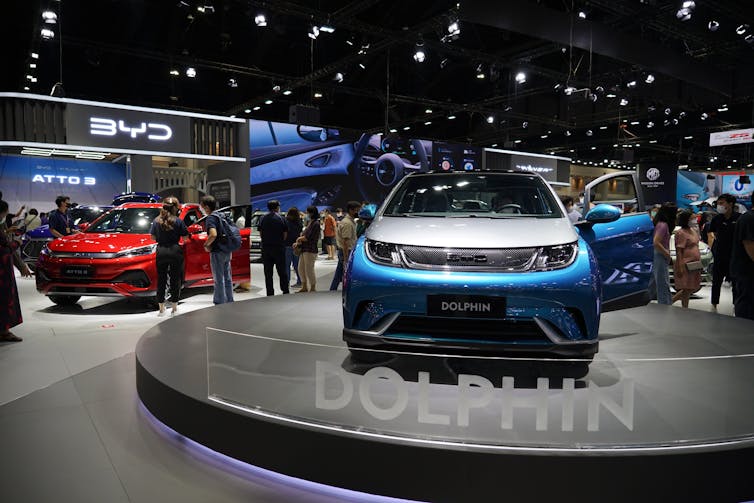With geologists hunting high and low for battery materials, an enormous new discovery of phosphate rock could have huge implications for the electric vehicle (EV) industry. The reserves, discovered in Rogaland, south west Norway by Anglo-Norwegian firm Norge Mining, are equivalent to at least 70 billion tonnes.
This is very close to the 71 billion tonnes of world reserves that we already knew about.
Phosphate is one of the key materials used in one type of lithium ion battery, known as “LFP”, and demand for these batteries – and the underlying phosphate – is growing fast. It is therefore a very big deal that some commentators have suggested this new deposit could meet the world’s phosphate rock needs for the next half a century.
Until this discovery, just five countries controlled 85% of global reserves, with 70% in Morocco alone. For now though it is China that mines the most phosphate rock, producing 85 million tonnes in 2021, with Morocco the next at 38 million tonnes.
This uneven distribution is a particular worry for those countries and regions that have missed out, as phosphate rock is considered a “critical material”.
Critical materials are elements that are economically important but are at risk of sudden supply disruptions or generally being in short supply.
The element phosphorus (phosphate is its naturally occurring form) is on the European critical materials list. In the UK, while phosphate rock is not on the critical materials list, it is instead on a “watchlist” of materials of concern.
Food v cars
The new discovery could avoid a looming conflict between farming and electric vehicles over scarce phosphate, perhaps with echoes of the “food vs fuel” dilemma as biofuels compete for agricultural land. Currently, about 90% of phosphate production goes into agricultural fertilisers (phosphorus is the “P” in NPK fertilisers).

The transport industry has to be more picky: only 10% of phosphorus found in sedimentary rock is suitable to make the high purity phosphoric acid used in those LFP car batteries. Perhaps the new Norway reserves will mean both can have as much as they need.
Previously, there had been a greater focus on other ways to manufacture lithium ion batteries, involving nickel and other materials such as cobalt, manganese or aluminium. These batteries store more energy at the same weight. However, they are themselves dependent on other critical elements (cobalt for instance is mostly found in the Democratic Republic of Congo).
In comparison, the materials used to produce LFP batteries are relatively cheap and abundant – some in the industry have jokingly referred to them as “rust and fertiliser” batteries. Elon Musk has said that his company, Tesla, plans to shift more of its vehicle production to LFP batteries, which offer suitable performance for medium range EVs and stationary storage, that over time.
They are also generally regarded as safer, they charge quickly and, unlike their rivals, they can be charged to 100% without losing any lifetime.

While the material used in LFP batteries does not perform quite as well (in terms of storage per weight) as nickel-based batteries, carmakers have tried to circumvent the problem by making the other components of the battery lighter. This could also help make these batteries more recyclable.
But herein lies another challenge for LFP batteries. Because the materials used to make them are that much cheaper, there is less value to recover at the end-of-life for recyclers, which makes the economics of recycling them more of a challenge.
The International Energy Agency has said LFP type batteries are used in 30% of the world’s new electric vehicles, and nearly all of this 30% is made in China.
The market for LFP batteries is forecast to grow from US$10 billion (£7.8 billion) to US$50 billion (£39 billion) in the period 2021-2028. In this context, the discovery in Norway is potentially a massive boon for European automakers, as one of the key battery materials might now be located on the doorstep.
That said, it is always a long journey from discovery of a resource to production, finding the resource represents the foot of the mountain. While the discovery is welcome, much must be done to mobilise this resource for the benefit of the battery industry.
If further exploration provides favourable results, Norway plans to fast-track the mine with an estimated opening date of 2028. So maybe some time in the next decade, you might enjoy your first trip in an electric car whose energy storage is enabled by Norwegian phosphate.![]()
This article was authored by Gavin D. J. Harper, research fellow, Birmingham Centre for Strategic Elements & Critical Materials, University of Birmingham. It was republished from The Conversation under a Creative Commons license. Read the original article.





